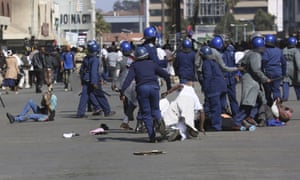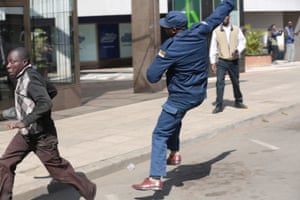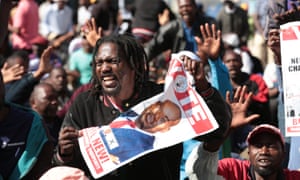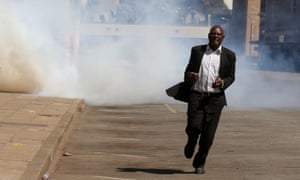
Riot police have charged hundreds of protesters in Zimbabwe and fired teargas, hours after a court ruled out an attempt by the opposition to overturn a ban on a planned demonstration.
As leaders of the Movement for Democratic Change (MDC), the main opposition party, debated whether to call off the protest on Friday, police armed with batons and whips moved to clear streets in the centre of Harare, the capital.
Witnesses reported chaotic scenes, with many protesters beaten, at least three injured and others loaded into armoured vehicles. Police also set up a series of checkpoints to stop MDC supporters reaching the centre of Harare and blocked off the headquarters of the MDC.
“People were peaceful and marched with order. They know that we always sing during demonstrations. Why are they beating us? Is this the democracy that they always talk about? They are the ones who are violent,” Mike Nyashanu, an unemployed 27-year-old who was being treated by paramedics for a suspected broken arm, told the Guardian.

The government had moved to block the demonstration with a prohibition order imposed late on Thursday. A high court judge refused to overturn the ban in an early morning hearing.
A spokesperson for Nelson Chamisa, the leader of the MDC, said the planned protest had not been called off, despite the court decision. Other protests are planned around Zimbabwe in coming days.
“The government has come out in full force. The legal decision [upholding the ban] is unconstitutional … [Chamisa] is concerned about loss of life but he believes the country will have to move forward,” Dr Nkululeko Sibanda said.
The protests come more than 18 months since Emmerson Mnangagwa took power after a military takeover ousted the veteran ruler Robert Mugabe in November 2017. Mnangagwa then went on to win a closely fought and contested election promising investment, transparency and “good days ahead” for the former British colony.
There are widespread fears that any unrest will prompt a brutal crackdown. In August last year six people were killed by troops deployed to clear the centre of Harare after an opposition rally against alleged vote rigging. In January, 13 died and hundreds were raped or beaten as security forces quelled unrest following a hike in fuel prices.
A statement from the Ministry of Information said officials were aware of “an incident where an unidentified woman was injured during … when the police tried to disperse an illegal demonstration”.
“The woman was taken to hospital and efforts are under way to establish her condition,” it said.

Six anti-government activists were abducted and tortured earlier this week, according to human rights groups. The activists were taken from their homes at night by armed men in unmarked cars, accused of involvement in the protests, stripped, beaten and then abandoned.
Amnesty International criticised “an escalating crackdown against human rights defenders, activists, civil society leaders and members of the opposition, including abductions and torture”.
Mnangagwa’s ruling Zanu-PF party, which holds a majority in parliament, has pushed through new security legislation which the opposition and human rights activists describe as very harsh.
The new laws will disappoint observers who hoped that authorities would reform, not simply replace, repressive laws dating back to Mugabe’s rule.
European and US officials are hoping that political reforms will accompany efforts to refloat Zimbabwe’s economy.
On Thursday, the president urged the opposition to engage in dialogue.
“Our strongest asset is our unity. I reiterate my calls to all opposition leaders that my door remains open [and] my arms remain outstretched. Riots [and] destructive violence must be rejected; peaceful constructive dialogue are the way forward,” he said in a statement.
In a letter to church leaders published on Friday in the state-owned Herald newspaper, Mnangagwa said the economic hardship had its roots in sanctions imposed by the west more than a decade ago as well as a severe drought this year.
He also said Chamisa had rejected his invitation to dialogue meant to resolve Zimbabwe’s political and economic problems.

Nick Mangwana, the permanent secretary at the information ministry, issued a statement blaming an unidentified “third force” for recent attacks on human rights activists and others.
Zimbabwe is crippled by massive debts incurred during Mugabe’s rule and needs a multibillion-dollar bailout to prevent economic collapse. However, continuing repression and a lack of tangible political reform mean there is little chance of international institutions offering major aid packages.
“This is not about political parties but for every Zimbabwean who is suffering. So why are they beating us? I have children and grandchildren, but I can’t even sell things on the streets to make a living because [the police] pounce on me,” Lydia Gonese, a 42-year-old protester, said.


